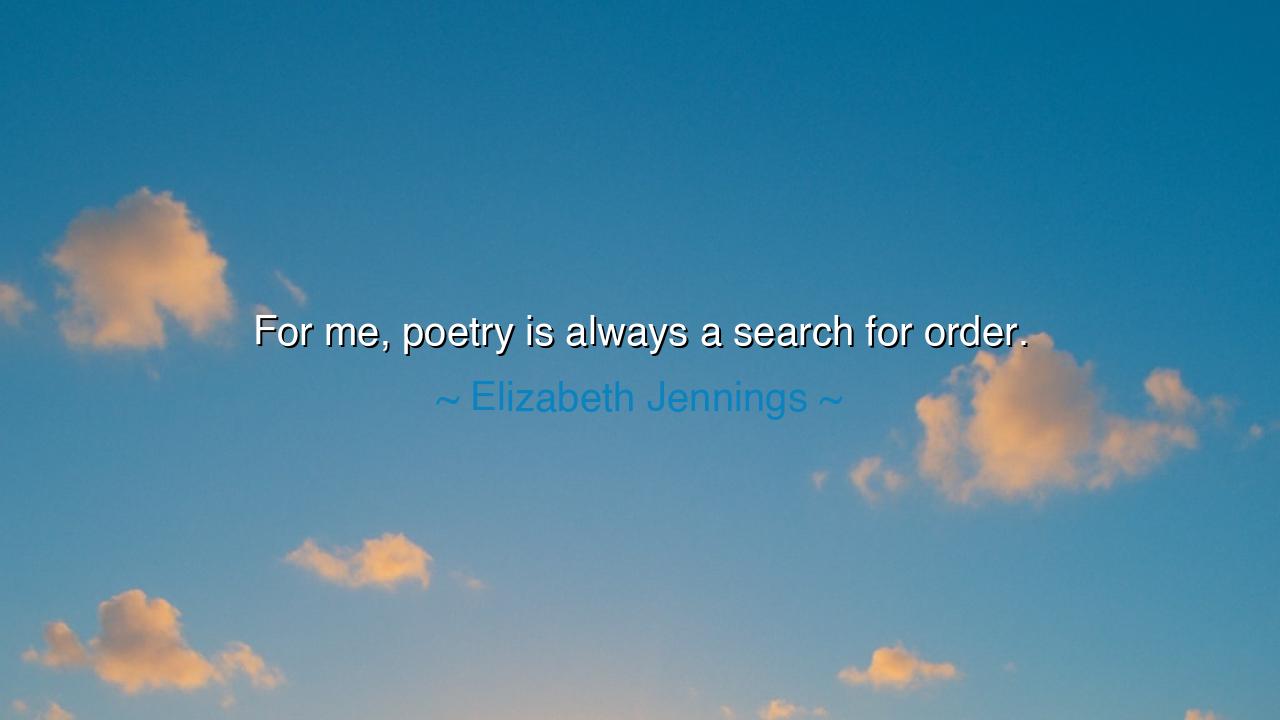
For me, poetry is always a search for order.






“For me, poetry is always a search for order.” Thus spoke Elizabeth Jennings, a poet of clarity and quiet strength, whose verses rose from inner turbulence yet sought the calm of form. In her words is revealed a truth known to many who wrestle with chaos: poetry is not merely a decoration of language, nor a fleeting indulgence of feeling, but a labor to bring shape to the shapeless, light to the confused, and harmony to the discordant.
The meaning of this saying lies in the nature of both life and poetry. Life is often disorderly, filled with grief, longing, confusion, and sudden change. The human heart suffers storms it cannot easily name. Poetry, for Jennings, was the craft of naming and arranging, the act of making sense where none could be found. The rhyme, the rhythm, the image—all become tools in this search for order. She knew that poetry does not abolish chaos, but it creates a frame in which chaos can be seen, understood, and even transformed into beauty.
The origin of Jennings’ insight is found in her own personal struggles. She battled mental illness, loneliness, and suffering, yet she never abandoned poetry. Rather, she used poetry as a way to steady herself against the whirlwinds of the mind. She was associated with "The Movement" in post-war England, a group of poets who valued clarity and structure over obscurity and excess. For Jennings, structure was not a cage, but a lifeline: a way to impose coherence on pain, a way to see through grief to meaning.
Consider also the story of Virgil, who, in the chaos of Rome’s civil wars, wrote the Aeneid. His epic sought to give the Romans a story of destiny and continuity, a sense of order in the midst of political ruin. The trials of Aeneas mirrored the trials of the people, but the poem gave them a vision of purpose and divine plan. Virgil, like Jennings, turned to poetry as a means of shaping chaos into meaning, showing that the art’s deepest purpose may be to impose order where history and fate seem only to scatter.
The lesson for us is profound: when life becomes too overwhelming, we too can turn to creation—whether through poetry, prayer, music, or reflection—to impose a form of order upon our confusion. To write a poem is to declare that the chaos does not have the final word, that beauty and meaning can still be drawn from the storm. Jennings teaches that poetry is not escape, but confrontation: a facing of disorder, and the shaping of it into something that can be borne.
Practically, this means we should not fear to take up pen or voice when we are troubled. Write your thoughts, give them rhythm, try to find images that contain what feels unbearable. In doing so, you are already imposing order upon the formless. If you do not write poetry, find another art or practice that creates patterns: painting, music, or even walking in prayerful meditation. Order is not given to us—we must seek it, and poetry is one of the noblest forms of this seeking.
Thus the teaching endures: poetry is indeed a search for order. It is the lamp held up in the darkness, the weaving of threads into a pattern, the gathering of broken pieces into wholeness. Jennings’ voice reminds us that we, too, can find order if we dare to name the chaos and work to shape it. The poet’s task is the task of every soul: to bring meaning out of confusion, and by doing so, to honor both the fragility and the resilience of the human spirit.






MHNguyen Tran My Han
The idea that poetry is a search for order seems like a reflection of our desire for understanding and control. But can poetry truly offer that order, or is it more about accepting the disorder of life? I wonder if Elizabeth Jennings felt that poetry helped her make sense of the world, or if it was a way of expressing something deeper and more mysterious than order itself.
VCTRANG VAN CHAY
This quote makes me think about how we often try to bring order to our lives, even in times of uncertainty. But does the process of trying to impose order on poetry limit the artist’s creativity? What would happen if a poet abandoned this search for order and embraced chaos? Would the poems be less meaningful, or perhaps more raw and real? There’s something intriguing about the tension between these two forces.
Vvynguyen1212
I’ve always believed that poetry can create meaning out of confusion. Does this idea of ‘order’ in poetry imply a kind of structure or form, like rhyme and meter? Or could it be something more abstract, like a search for emotional clarity? I’m curious to know if Elizabeth Jennings views this order as a personal journey or if it's a universal truth she seeks to express through her writing.
PNPhat Nguyen
I wonder if poetry, in seeking order, could ever truly capture the chaos of human emotion. Can it organize the messiness of life, or does it simply present a comforting illusion of control? What happens when order fails in poetry—does the poem lose its meaning, or does it find something new? This search for order seems both comforting and limiting at the same time.